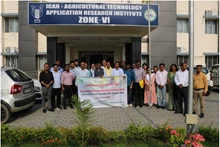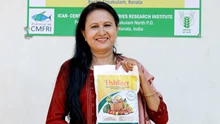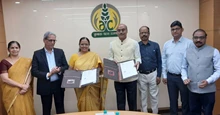
Dr Rajvir Rathi, Head- Agricultural Policy & Stakeholder Affairs, Bayer Crop Science was speaking at the conference on 'Innovate, Protect, Prosper: Role of Intellectual Property Protection in taking India's Seed Sector to the Next Level', organized by the Federation of Seed Industry of India in the capital on May 03, 2024.
Statement by Dr Rajvir Rathi
“The seed and biotechnology industries are pivotal drivers of agricultural innovation, productivity, and sustainability globally, with profound implications for India's food security and economic development. India's agricultural sector employs over 50% of the country's workforce and contributes approximately 17-18% to its GDP as of 2022. However, this sector faces numerous challenges, including climate change, resource scarcity, and the imperative for technological advancements to meet the growing demands of a burgeoning population.
The landscape of intellectual property rights (IPR) in the seed and biotechnology sectors presents both opportunities and challenges. India has established a comprehensive legal framework governing intellectual property rights, including the Patents Act, 1970, which was amended in 2005 to allow for the patenting of microorganisms and genetically engineered organisms. Additionally, the Protection of Plant Varieties and Farmers' Rights Act (PVPFRA) was enacted in 2001 to protect the rights of plant breeders and farmers while promoting the development of new plant varieties.
The PVPFRA provides for the protection of plant varieties through the grant of plant breeder's rights (PBR), which allow breeders to exclusively market and sell their protected varieties for a specified period. The Act also recognizes the rights of farmers to save, use, exchange, and sell farm-saved seeds of protected varieties, thereby ensuring the continued availability of seeds to farmers. Challenges persist in effectively leveraging intellectual property to drive innovation and competitiveness in the seed and biotechnology sectors. These challenges include ensuring fair and equitable access to genetic resources, strengthening mechanisms for IP protection and enforcement, facilitating technology transfer and licensing agreements, navigating complex regulatory frameworks, and building capacity and awareness among stakeholders.

Learning from global experiences, countries have recognized the importance of a balanced approach to intellectual property rights. Strong IP protection is crucial for incentivizing innovation and investment, but overly restrictive IP regimes can hinder access to technology and impede technology transfer, particularly in developing countries. Collaborative research initiatives, public-private partnerships, and open innovation models have proven effective in accelerating the pace of innovation and addressing complex challenges.
In recent years, international organizations such as the World Intellectual Property Organization (WIPO) and the Food and Agriculture Organization (FAO) have been actively engaged in facilitating dialogue, sharing best practices, and providing technical assistance to countries seeking to strengthen their intellectual property regimes in the agricultural sector.
By drawing upon these global best practices and learnings, India can develop a nuanced approach to intellectual property that fosters innovation, promotes technology transfer, and addresses the unique challenges facing its seed and biotechnology industries. By leveraging international collaborations, capacity-building initiatives, and knowledge-sharing platforms, India can position itself as a leader in agricultural innovation while ensuring equitable access to essential technologies for sustainable development.
India's agricultural sector is undergoing rapid transformation, driven by advancements in biotechnology and seed technologies. Intellectual property plays a critical role in protecting these innovations, encouraging investment, and ensuring fair competition. For India's seed and biotechnology industries, effective IP management is essential for sustainable growth, technology transfer, and global competitiveness.”
As the World Intellectual Property Day is celebrated annually on April 26th, it is paramount to raise awareness about the role of intellectual property (IP) rights in fostering innovation and creativity. In India, where the seed and biotechnology industries are crucial for agricultural development and technological advancement, recognizing the significance of IP is paramount. This concept note outlines a proposed event to commemorate World Intellectual Property Day, focusing on its relevance to India's seed and biotechnology sectors,” he added.











